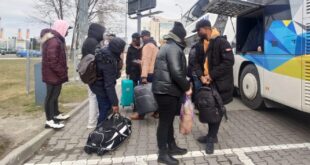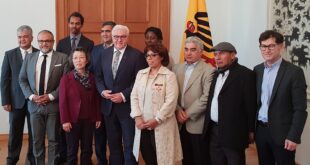Federal Interior Minister Nancy Faeser, speaking in the Bundestag (federal parliament) on Wednesday, said the registration of displaced persons from the war in Ukraine was currently being improved.
Refugees who are admitted to initial reception centres are registered there. This should be further intensified, she said.
As at Wednesday (16 March), the Federal Police had registered around 175,000 refugees from Ukraine in Germany. Because there are no seamless controls at the border with Poland and Ukrainians with biometric passports can enter the country without a visa and registration for 90 days, the actual number is probably higher, officials say. Ukrainians only have to register after the 90 days have expired or if they apply for state benefits earlier.
Criticism came from the CDU/CSU about the incomplete knowledge of those entering the country and they demanded border controls. Visa-free entry is simply the legal situation, Faeser countered the criticism. She rejected border closures, among other things because of the then unavoidable waiting time at the border. She did not want people to have to camp in front of the border before they were provided with the basic necessities.
On Thursday, the premiers of the federal states will meet with Chancellor Olaf Scholz for consultations on, among other things, how to deal with the refugees.
According to the UN refugee agency UNHCR, around three million people have now fled Ukraine since the Russian attack on Ukraine began on 24 February. More than 1.8 million of them have been taken in by Poland. In Germany, most refugees arrive in Berlin and other large cities. According to Minister Faeser, people who are not accommodated privately are now distributed among the federal states according to their population size and economic strength.
Austin Ohaegbu
 THE AFRICAN COURIER. Reporting Africa and its Diaspora! The African Courier is an international magazine published in Germany to report on Africa and the Diaspora African experience. The first issue of the bimonthly magazine appeared on the newsstands on 15 February 1998. The African Courier is a communication forum for European-African political, economic and cultural exchanges, and a voice for Africa in Europe.
THE AFRICAN COURIER. Reporting Africa and its Diaspora! The African Courier is an international magazine published in Germany to report on Africa and the Diaspora African experience. The first issue of the bimonthly magazine appeared on the newsstands on 15 February 1998. The African Courier is a communication forum for European-African political, economic and cultural exchanges, and a voice for Africa in Europe.



































